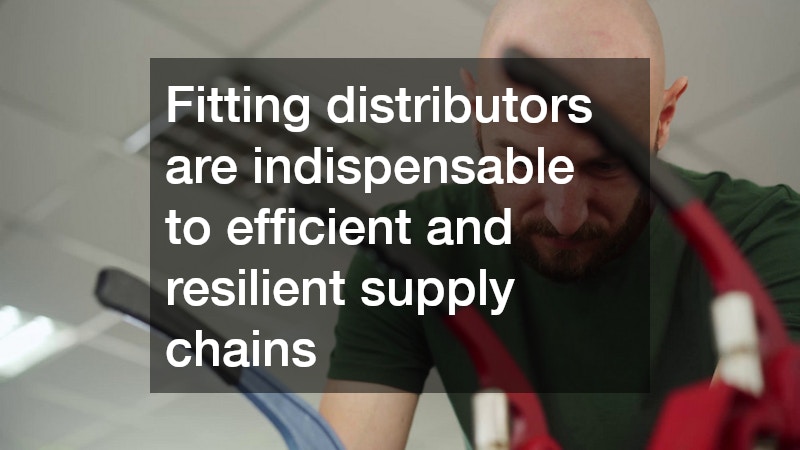In today’s fast-paced business environment, efficient supply chains are crucial for success. Understanding the role of fitting distributors can significantly enhance the efficiency of your supply chain, reduce costs, and improve overall performance. This article explores the importance of fitting distributors and how they drive supply chain efficiency. By ensuring the right components are available at the right time, fitting distributors help prevent costly delays and downtime.
They also provide valuable technical expertise, assist with inventory management, and foster stronger relationships between manufacturers and end-users. Leveraging their services can lead to more streamlined operations and a stronger competitive edge.
What Role Do Fitting Distributors Play in Supply Chains?
Connection Between Manufacturers and Retailers
Fitting distributors act as a vital link between manufacturers and retailers, ensuring the smooth flow of products from production to the point of sale. They oversee the complex process of transferring goods, which involves coordinating logistics, managing transportation, and handling storage solutions.
This intermediary role not only facilitates timely delivery of products but also minimizes the risks of disruptions and delays. By maintaining a robust communication channel between manufacturers and retailers, fitting distributors align production schedules with demand, thus preventing overproduction or shortages.
The strategic placement of distributors further amplifies this connection, often reducing geographical limitations and broadening market reach. For instance, distributors with regional warehouses can significantly decrease shipping times, enhancing overall supply chain efficiency.
Streamlining Inventory Management
Efficient distributors play a crucial role in streamlining inventory management by ensuring that products are available where and when they are needed most. They achieve this by implementing advanced inventory tracking technologies that provide real-time data on stock levels and reorder points.
By minimizing lead times, distributors can respond swiftly to fluctuations in demand, thereby avoiding both overstock and stockouts. Effective inventory management strategies adopted by distributors involve predictive analytics that forecast trends and guide procurement decisions.
Moreover, distributors can optimize stock levels by collaborating with multiple stakeholders within the supply chain, adjusting order sizes, and scheduling to align with retailer needs. This capability is particularly significant during peak seasons or emergencies when demand volatility is high.
How to Choose the Right Fitting Distributor?
Evaluating Distributor Capabilities
Choosing the right distributor requires a meticulous evaluation of their core capabilities, focusing on logistical efficiency, delivery accuracy, and product range. These factors determine a distributor’s ability to support your supply chain needs adequately.
Additionally, assessing a distributor’s technological adoption can reveal their capability to offer innovative solutions such as automated order processing and tracking systems. A distributor’s capacity to handle diverse product lines can further facilitate streamlined operations, especially for companies with varied inventory requirements.
Therefore, aligning your supply chain requirements with the distributor’s capabilities is essential for enhancing operational efficiency. This involves thorough due diligence to ensure they possess the necessary scalability and infrastructure to support your growth objectives.
Assessing Partnerships and Reputation
Understanding the network and reputation of potential distributors is critical in making an informed decision. Investigating their partnerships within the industry provides insights into their market influence and reliability.
A reputable distributor often translates to superior customer service, timely delivery, and fewer errors, thus enhancing supply chain reliability. Collaborations with reputable third-party logistics providers can denote a distributor’s commitment to maintaining high standards.
Reviews and testimonials can serve as potent indicators of a distributor’s reputation. Evaluating feedback from existing customers will provide a clearer picture of their service quality, responsiveness, and support structures in place.
How Can Fitting Distributors Enhance Supply Chain Resilience?
Mitigating Supply Chain Disruptions
Distributors play an instrumental role in enhancing supply chain resilience by proactively mitigating potential disruptions. They achieve this by maintaining flexible operations and implementing robust contingency plans.
By establishing a network of backup suppliers and alternate routes, distributors can quickly adapt to changes, ensuring seamless continuity of supply. This proactive stance minimizes reliance on singular sources, thus diversifying risk.
Furthermore, their ability to mobilize resources swiftly during emergencies ensures that supplies remain uninterrupted, safeguarding against potential revenue loss. Through effective use of these strategies, distributors maintain a competitive edge even in fluctuating market conditions.
Leveraging Technology and Innovation
Modern fitting distributors leverage technology and innovation to enhance supply chain resilience. Advanced analytical tools allow them to track, analyze, and predict supply chain trends, improving decision-making processes.
By harnessing big data and AI, distributors can anticipate disruptions before they occur and implement preventative measures. This proactive approach ensures a seamless flow of goods, enhancing the overall reliability of the supply chain network.
Technology also facilitates transparency and real-time communication among supply chain partners, fostering collaboration and reducing response times to potential issues. These technological capabilities are crucial in navigating today’s complex global supply chains.
Fitting distributors are indispensable to efficient and resilient supply chains. By choosing the right partners and leveraging their capabilities, businesses can optimize their operations, reduce costs, and ensure consistent product availability, ultimately leading to greater customer satisfaction and competitive advantage. As the supply chain landscape continues to evolve, the strategic role of fitting distributors remains pivotal in shaping sustainable growth and operational excellence for businesses globally.
.




